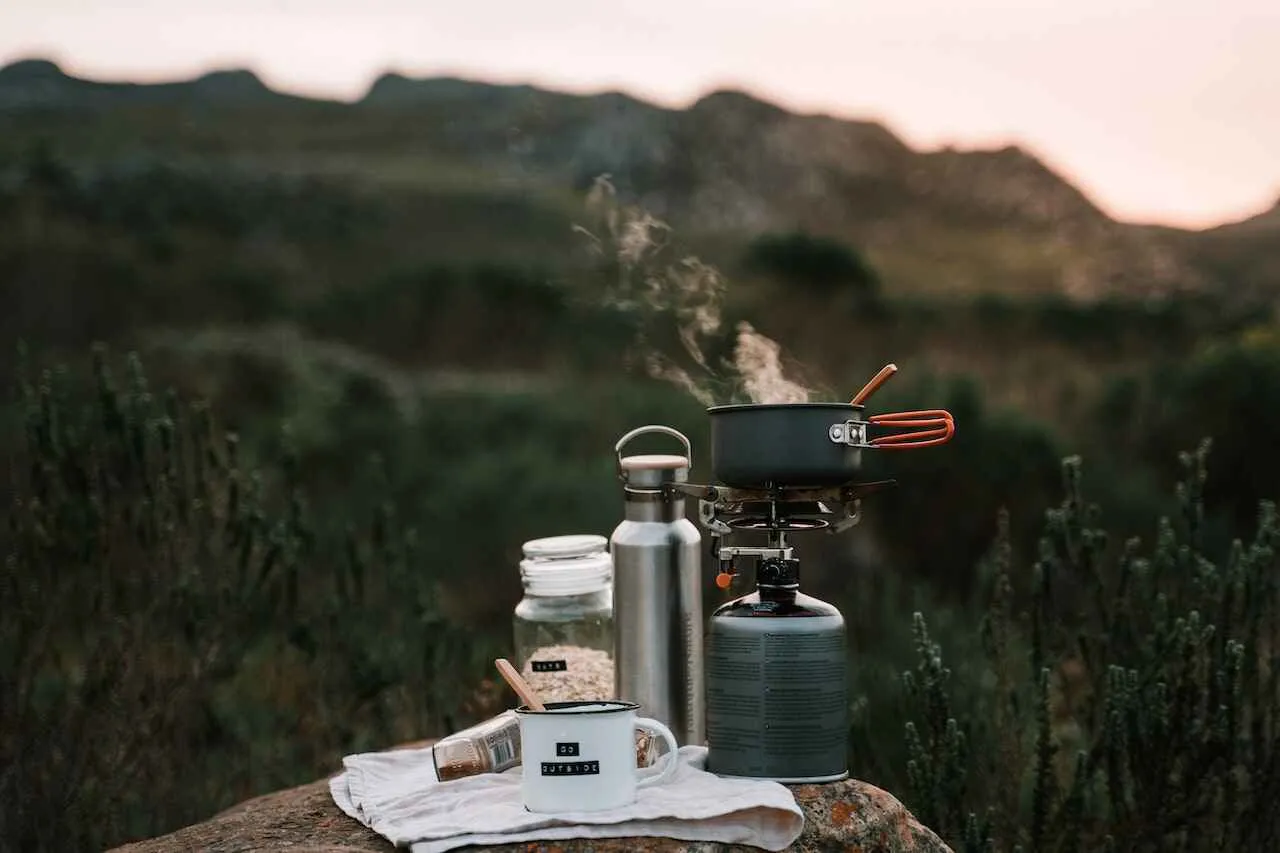
Camping Breakfast Ideas: Fuel Up for Your Traveling Adventures
When setting out on exciting travel adventures, it’s essential to start the day with a hearty breakfast that provides the necessary fuel to keep you energized. Camping breakfast ideas, like frittatas, pancakes, and breakfast burritos, in particular, hold a special place in the hearts of outdoor enthusiasts. Not only do they satisfy hunger pangs, but they also set the tone for memorable moments in the wilderness.
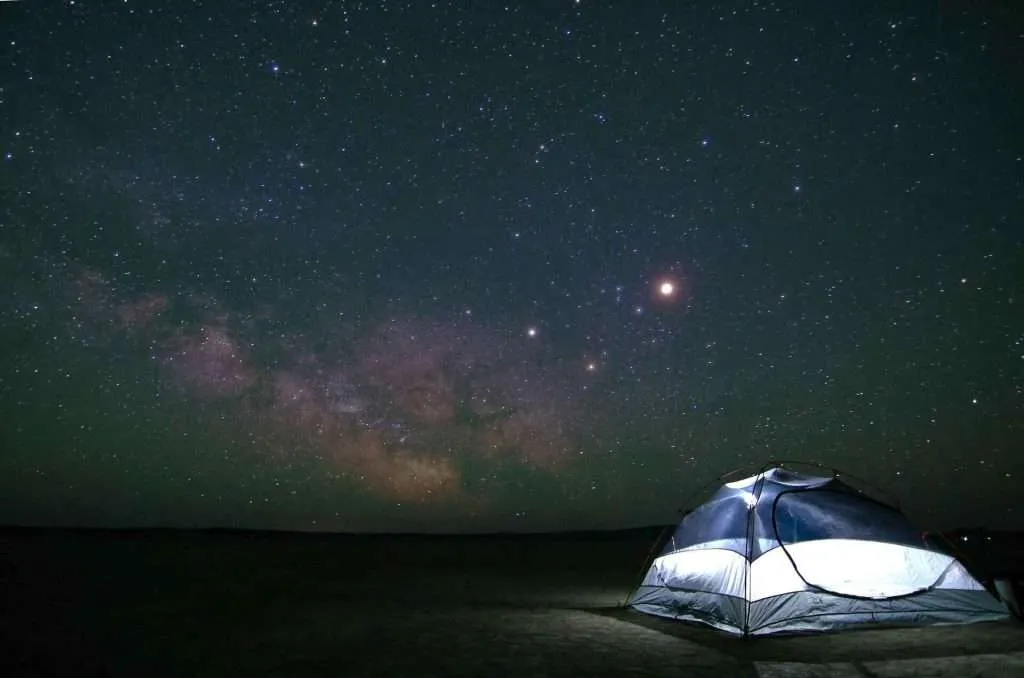
What Should I Eat for Breakfast When Camping?
When choosing breakfast for camping, consider several factors. The breakfast you select should be convenient, nutritious, and easy to prepare, allowing you to make the most of your outdoor experiences. Here are some key considerations and ideas to inspire your camping breakfast menu.
Portability and Convenience
When camping, have easy-to-pack, store, and transport breakfast options. Look for foods that don’t require elaborate cooking methods or extensive refrigeration. Portable breakfast options like overnight oats, wraps, and parfaits can be prepped and enjoyed on the go.
Nutritional Balance
A balanced breakfast is crucial to sustain your energy levels during outdoor activities. Aim for a combination of carbohydrates, protein, and healthy fats. You can achieve this by including oats, eggs, nuts, seeds, yogurt, and fresh fruits in your camping breakfast repertoire. These options provide a good mix of nutrients to keep you fueled throughout the day.
Consider Dietary Restrictions
Consider food allergies, intolerances, and dietary needs like gluten-free or vegan for you and your fellow campers. Explore alternatives and substitutions that can accommodate different dietary needs. For example, if you or someone in your group follows a gluten-free diet, consider gluten-free oats or wraps as alternatives to traditional options.
Quick and Easy Camping Breakfast Ideas
Here are some quick and easy camping breakfast ideas to get you started.
Overnight Oats with Customizable Toppings
Prepare a jar of overnight oats by combining oats, milk (or a non-dairy alternative), and sweeteners of your choice. Let it sit in the fridge overnight, and in the morning, add a variety of delicious toppings such as fresh fruits, nuts, or seeds.
Grab-and-Go Breakfast Wraps or Sandwiches
Fill tortillas or bread with protein-rich ingredients like scrambled eggs, cheese, deli meats, or spreads like nut butter or avocado. Wrap them tightly in foil or parchment paper for easy transportation.
Yogurt Parfaits with Dried Fruits and Granola
Layer yogurt, fruit, and granola in a to-go cup. Customize your parfait by adding additional toppings such as honey or cinnamon.
Energy Bars or Trail Mix
Prepare homemade or store-bought energy bars using nuts, dried fruits, and grains. Create a personalized trail mix by combining your favorite nuts, seeds, and dried fruits for a quick and energizing snack.
By considering factors like portability, nutritional balance, and dietary restrictions, and incorporating these quick and easy camping breakfast ideas, you can kick-start your day with a satisfying and nourishing meal during your outdoor adventures.
What Are Good Foods to Take Camping
Planning meals and packing suitable food items are essential for a successful camping trip. To ensure you have an array of options and minimize food waste, consider the following suggestions when selecting foods to take camping.

Importance of Planning Meals
When camping, having a well-thought-out meal plan is crucial. It helps you determine the quantities of food needed, minimizes the risk of running out of essentials, and reduces the chances of food spoilage. Plan your meals, considering the duration of your trip, the number of campers, and the availability of cooking facilities.
Convenience and Practicality
Choose foods that are easy to prepare, require minimal cooking equipment, and have a longer shelf life. Canned goods, pre-packaged meals, and dehydrated or freeze-dried foods are excellent options. They are lightweight, take up less space, and can be rehydrated or heated with minimal effort.
Fresh Ingredients
Convenience is crucial, but fresh ingredients improve the taste and nutrition of camping meals. Opt for a sturdy product that can withstand outdoor conditions, such as apples, oranges, carrots, bell peppers, and hardy greens like kale or spinach. These can be enjoyed raw or incorporated into simple recipes.
Protein Sources
Protein is vital for sustained energy during outdoor activities. Consider packing protein-rich foods like canned tuna, salmon, chicken, jerky, dried beans, or tofu. These options provide a good source of protein and can be used in various camping meals.
Carbohydrate Staples
Carbohydrates are an excellent energy source. Pack staples like rice, pasta, quinoa, or couscous that are easy to cook and versatile in different recipes. They serve as a base for meals and combine with vegetables, proteins, or sauces for delicious camping dishes.
Condiments and Spices
Don’t forget to bring essential condiments and spices to enhance the flavors of your camping meals. Pack small amounts of salt, pepper, olive oil, hot sauce, or your favorite seasoning blends. These small additions can make a significant difference in the taste of your dishes.
By planning and selecting convenient, practical, and versatile food items, you’ll have a well-rounded camping meal plan that caters to your nutritional needs and culinary preferences. With a bit of preparation, you can enjoy delicious and satisfying meals even in the great outdoors.
Eating Cheap: Budget-Friendly Camping Breakfast Ideas
Camping doesn’t have to break the bank when it comes to meals. With some smart choices and budget-friendly ideas, you can enjoy delicious and satisfying breakfasts without overspending. Here are some tips and budget-friendly camping breakfast ideas to help you eat cheaply while camping.
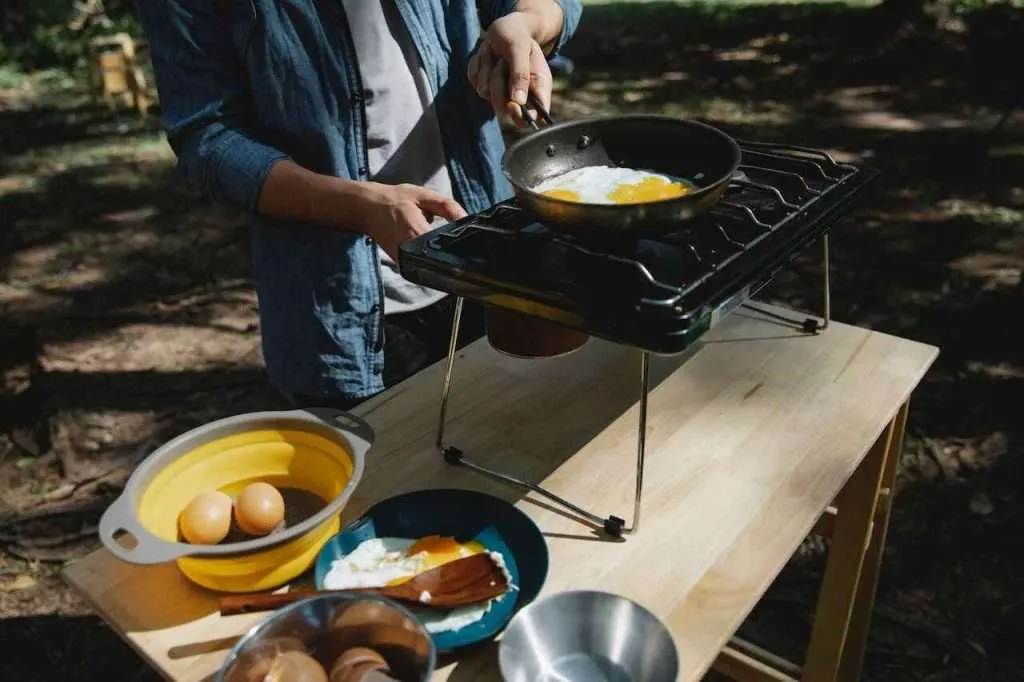
Plan and Prep Ahead
One of the keys to saving money on camping meals is to plan and prep ahead of time. Make a detailed meal plan, create a shopping list, and stick to it. By knowing exactly what ingredients you need, you can avoid impulse purchases and prevent food waste. Prepping ingredients in advance, such as chopping vegetables or marinating meats, can also save you time and money during the camping trip.
Focus on Staple Ingredients
Staple ingredients like oats, eggs, bread, and canned goods are affordable and versatile. They can be used in a variety of breakfast recipes and provide a good base for budget-friendly meals. Consider incorporating these staples into your camping breakfast menu to keep costs low.
Simple Breakfast Options
Opt for simple and inexpensive breakfast options that require minimal ingredients and preparation. For example, you can make a batch of homemade granola using oats, nuts, and dried fruits. Serve it with yogurt or milk for a wholesome and affordable breakfast.
Egg Dishes
Eggs are a budget-friendly protein source that can be used in various breakfast recipes. Whip up a classic scrambled egg dish or make a veggie-packed omelet using ingredients like bell peppers, onions, and cheese. You can also prepare egg sandwiches or wraps with fillings like ham, cheese, and vegetables.
Campfire Toast
Campfire toast is a simple yet satisfying breakfast idea. Pack some bread slices, butter, and your favorite spreads. Toast the bread over the campfire and spread it with butter, jam, peanut butter, or Nutella for a delicious and cost-effective breakfast.
Pancakes or Waffles
Homemade pancakes or waffles are easy to make and cost-effective. Prepare the dry mix at home by combining flour, baking powder, sugar, and salt. Store it in an airtight container and add the wet ingredients (milk, eggs, oil) when ready to cook. Serve with syrup, fresh fruits, or yogurt for a budget-friendly breakfast treat.
Utilize Leftovers
Don’t let leftovers go to waste. Incorporate them into your breakfast meals to stretch your budget further. For example, if you had grilled sausages or vegetables the night before, chop them up and add them to an omelet or breakfast burrito.
By planning, focusing on staple ingredients, and opting for simple and budget-friendly breakfast options, you can enjoy delicious meals without overspending during your camping adventures.
Cookware for Camping: What do you cook with when camping
Having the right cookware and utensils is essential for preparing meals while camping. Proper cookware ensures efficient cooking and allows you to explore a variety of recipes. Consider the following when selecting cookware for your camping adventures.

Essential Cooking Equipment
- Camp Stove: A portable camp stove is a versatile and convenient cooking option. Look for a lightweight and compact stove that suits your needs. Gas-powered stoves are popular due to their ease of use and quick setup.
- Dutch Oven: A Dutch oven is a versatile piece of cookware that allows you to prepare a wide range of meals. It’s ideal for slow-cooking stews, soups, casseroles, and even baking bread. Choose a cast-iron Dutch oven for durability and even heat distribution.
- Skillet or Frying Pan: A skillet or frying pan is a must-have for cooking various breakfast items like eggs, bacon, pancakes, and stir-fries. Opt for a durable and non-stick option to make cooking and cleaning easier.
- Pot: A medium-sized pot with a lid is essential for boiling water, cooking pasta, or preparing soups and sauces. Look for a lightweight option with a sturdy handle for easy handling.
- Grilling Rack or Grill Plate: If you enjoy grilling, consider bringing a grilling rack or grill plate that can be placed over a campfire or camp stove. It allows you to cook meats, vegetables, and even toast bread with that delicious smoky flavor.
Versatile Utensils
- Spatula: A spatula is essential for flipping pancakes, eggs, and burgers. Look for a heat-resistant and sturdy spatula that can withstand high temperatures.
- Tongs: Tongs are handy for turning and handling food on the grill or campfire. Use long, sturdy tongs to keep your hands safe from heat.
- Cooking Spoon: A cooking spoon is useful for stirring soups, sauces, and other dishes. Look for a heat-resistant spoon with a long handle for easy stirring.
- Cutting Board and Knife: Pack a small cutting board and a sharp knife for food preparation. Choose a compact and lightweight cutting board that won’t take up much space in your camping gear.
- Can Opener: If using the cans, don’t forget can opener. For utensil kit, compact and easy can opener.
Remember to pack heat-resistant gloves, pot holders, and cleaning supplies like dish soap and scrubbers for easy cleanup.
Having the right cookware and utensils ensures a smooth cooking experience while camping. Invest in durable, lightweight, and versatile options that suit your cooking preferences and allow you to prepare a variety of delicious meals.
What is a High Protein Meal to Take Camping
Protein is an essential nutrient for sustained energy and muscle recovery, making it crucial for outdoor activities during camping trips. Here are some high-protein meal ideas that are convenient and suitable for camping.
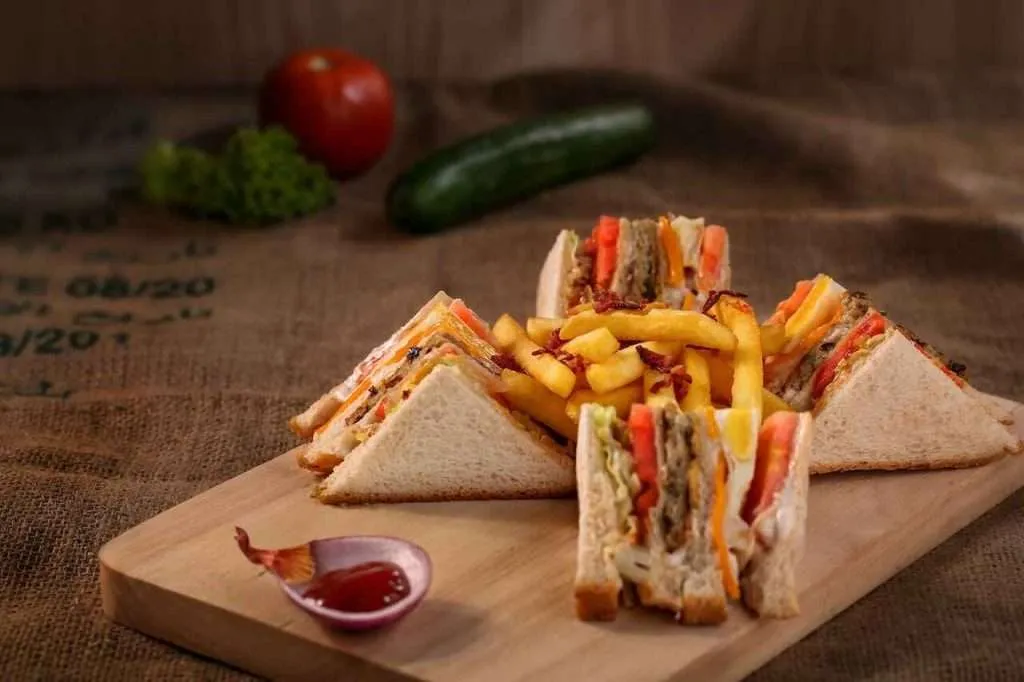
Protein-Packed Granola Bars
Make your granola bars using ingredients like oats, nuts, seeds, and protein powder. These homemade bars are not only high in protein but also customizable to your taste preferences. Wrap them individually for easy grab-and-go options during your camping adventures.
Grilled Chicken Skewers
Marinate chicken chunks in your favorite spices and grill them on a campfire or portable grill. Chicken is a lean source of protein and grilling adds a delicious smoky flavor. Thread the marinated chicken onto skewers for a fun and flavorful camping meal.
Lentil or Bean Salad
Prepare a hearty lentil or bean salad packed with protein, fiber, and nutrients. Cook lentils or beans ahead of time and toss them with chopped vegetables, herbs, and a simple vinaigrette. This protein-rich salad can be enjoyed as a main dish or a side with grilled meats.
Tofu Scramble
For a plant-based protein option, try a tofu scramble. Crumble tofu and sauté it with vegetables like bell peppers, onions, and spinach. Season it with spices like turmeric, cumin, and nutritional yeast for a savory and protein-packed breakfast.
Quinoa Salad
Quinoa is a complete protein and makes a nutritious base for salads. Cook quinoa in advance and mix it with diced vegetables, herbs, and a tangy dressing. Add some grilled chicken, tofu, or chickpeas for an extra protein boost.
Remember to pack these high-protein meals in sealed containers or resealable bags to keep them fresh and portable during your camping trip. Also, don’t forget to bring along any necessary cooking equipment like a grill or skillet for grilling or sautéing.
Including high-protein meals in your camping menu will help keep you energized and satisfied throughout your outdoor activities.
Food Storage: Where do you put food at night when camping
Ensuring proper food storage while camping is essential for both safety and preventing unwanted encounters with wildlife. Here are some tips on where to store your food at night during camping.
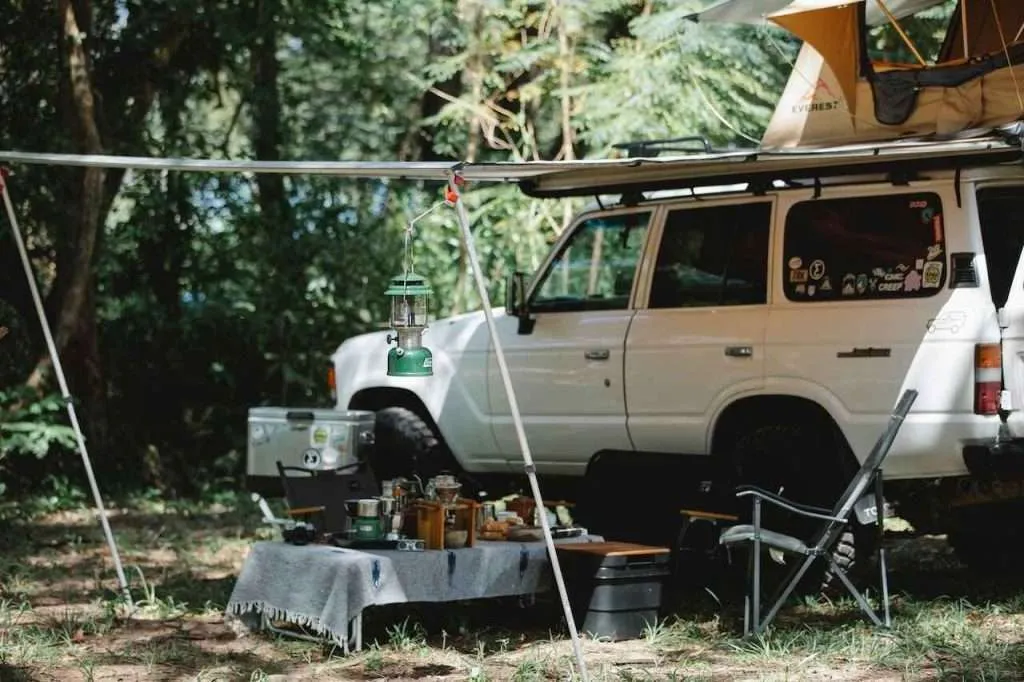
Use Bear-Resistant Containers
If you’re camping in bear country, it’s crucial to use bear-resistant containers for storing your food. These containers are specially designed to prevent bears from accessing the food inside. Follow the instructions provided with the container to ensure proper usage.
Hang Food from a Tree
In areas where bear-resistant containers are not available, the next best option is to hang your food from a tree. Use a bear hang or food hanging technique to suspend your food at least 10 to 15 feet above the ground and 4 to 6 feet away from the trunk. This will keep it out of reach of bears and other critters.
Utilize Food Lockers or Storage Bins
Some campsites provide designated food lockers or storage bins to safely store your food overnight. These lockers are often bear-resistant and ensure that your food is secure. Check with the campground or park authorities beforehand to see if such facilities are available.
Keep Food in Your Vehicle
If you have access to a vehicle near your campsite, you can store your food inside the car. Make sure all windows and doors are securely closed, and the food is out of sight to prevent attracting animals. However, remember that some national parks and wilderness areas may require you to use designated food storage lockers even if you have a vehicle.
Separate Food from Sleeping Areas
Regardless of the storage method you choose, it’s crucial to keep your food separate from your sleeping area. Store your food at a safe distance from your tent to minimize the risk of attracting animals during the night.
Remember to dispose of food waste properly by using designated garbage bins or packing it out with you. Leaving food waste behind can disrupt the natural ecosystem and attract unwanted animals.
By following these food storage practices, you can help ensure a safe and enjoyable camping experience while minimizing the potential for wildlife encounters.
Storing Eggs for Camping: How do you store eggs for camping
Eggs are versatile and nutritious food that can be enjoyed for breakfast or in various camping recipes. However, they require special care when it comes to storage. Here are some methods for safely storing eggs while camping.
Pre-crack and Store in a Container
One method is to pre-crack your eggs and store them in a leak-proof container. Beat the eggs lightly and transfer them to a clean, airtight container or a sealable plastic bag. Make sure the container is well-sealed to prevent any leakage and place it in a cooler with ice packs.
Use a Portable Egg Carrier
Another option is to use a portable egg carrier specifically designed for camping. These carriers are usually made of durable plastic and have individual compartments to hold the eggs securely. They provide excellent protection and prevent the eggs from getting damaged during transportation.
Carry Hard-Boiled Eggs
If prefer hard-boiled eggs, cook ahead and store in cooler. Last longer and less fragile. Peel the shells before storing them to save time and hassle during your camping trip.
Opt for Egg Substitutes
If you’re concerned about the fragility of eggs or want a longer shelf life, consider using egg substitutes or powdered eggs. These alternatives come in powdered or liquid form and are convenient for camping. Follow the instructions on the packaging for preparation and storage.
When storing eggs, it’s essential to keep them at a safe temperature to prevent the growth of bacteria. Store them in a cooler with sufficient ice packs or ice to maintain a temperature below 40°F (4°C). Avoid placing the eggs directly on the ice, as the extreme cold can cause them to freeze and crack.
Remember to handle eggs with care during transportation and storage. Place them in a sturdy container or cooler to protect them from any impacts or movements that could result in breakage.
By using these methods, you can enjoy the convenience and nutritional benefits of eggs while camping without worrying about their storage and transportation.
Easy Camping Breakfast Ideas for Family
Camping is a wonderful opportunity for families to bond and create lasting memories. When it comes to breakfast, simplicity is key, allowing everyone to enjoy a delicious meal without spending too much time on preparation. Here are some easy camping breakfast ideas that the whole family will love.
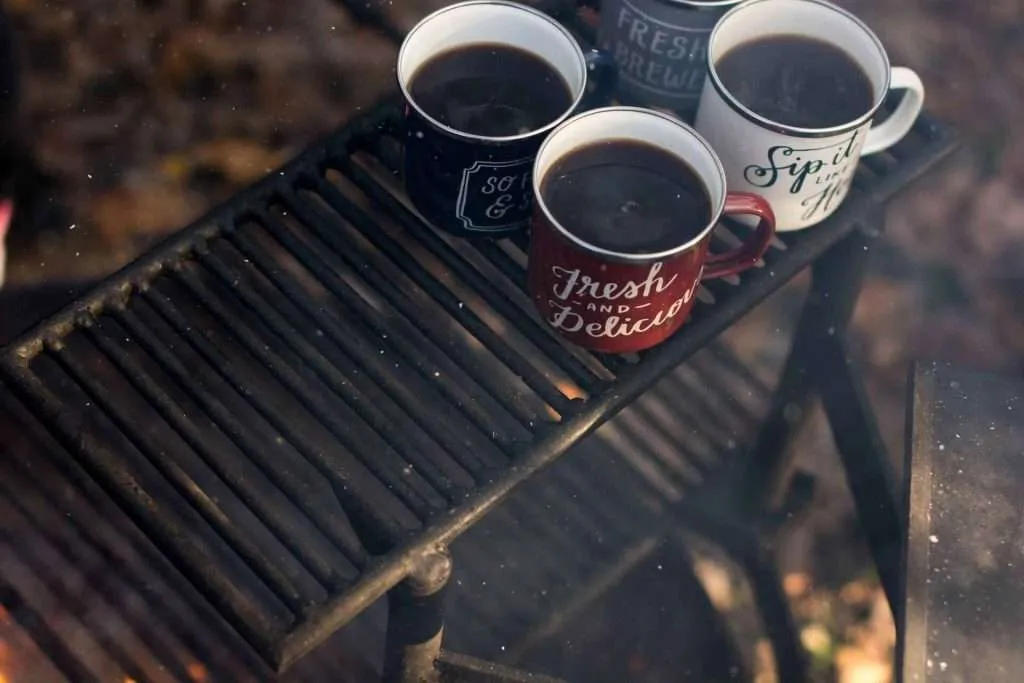
Pancakes or Waffles
Prepare the pancake or waffle batter in advance and store it in a sealable container. On the stove or griddle, pour the batter and cook until browned. Serve with fruit, syrup, or whipped cream.
Breakfast Burritos
Make breakfast burritos by filling tortillas with scrambled eggs, cooked bacon or sausage, cheese, and diced vegetables. Wrap them in foil and heat them over the campfire or camping stove. The result is a hearty and portable breakfast that can be customized to individual preferences.
Campfire Toast
Toast bread over the campfire for a simple, satisfying breakfast. You can use a long-handled toasting fork or place the bread on a grill grate. Top the toast with spreads like peanut butter, jam, or Nutella for added flavor.
Yogurt Parfaits
Layer yogurt, granola, and fresh fruits in individual cups or bowls to create tasty and nutritious yogurt parfaits. This quick and easy breakfast option provides a good balance of protein, carbohydrates, and vitamins to fuel your family’s adventures.
Cereal and Milk
Sometimes, a fuss-free breakfast is all you need. Pack individual servings of your family’s favorite cereal in resealable bags or containers. In the morning, pour milk into bowls and let each family member add their preferred cereal. It’s a convenient option that requires minimal preparation and cleanup.
Remember to involve the whole family in the breakfast preparation process. Assign tasks like setting the table, pouring drinks, or arranging the toppings. This not only helps lighten the workload but also encourages participation and a sense of togetherness.
Camping breakfasts for families should be enjoyable and stress-free. These easy ideas ensure that everyone starts the day with a satisfying meal, setting the tone for a fantastic camping adventure.
Creative Camping Breakfast Recipes
For camping breakfast, always fun to be creative and try new things. These unique and flavorful recipes will elevate your camping breakfast experience.
Dutch Oven Breakfast Casseroles
Using a Dutch oven, you can create delicious breakfast casseroles that are perfect for feeding a group. Layer ingredients like eggs, sausage, vegetables, and cheese in the Dutch oven and bake it over the campfire or with charcoal briquettes. The result is a hearty and satisfying breakfast that will keep everyone energized.
Campfire French Toast
Put a camping twist on a classic breakfast favorite by making campfire French toast. Dip bread in a batter of eggs, milk, cinnamon, and vanilla. Cook the slices on a greased griddle or cast-iron skillet over the campfire until they’re golden brown. Serve with maple syrup and fresh berries for a delightful morning treat.
Campfire Skillet Hash
Create a hearty and flavorful breakfast skillet by combining diced potatoes, cooked sausage or bacon, onions, bell peppers, and any other desired vegetables. Cook everything together in a cast-iron skillet over the campfire until the potatoes are tender and the flavors meld together. Top with shredded cheese for an extra indulgence.
Breakfast Quesadillas
Make breakfast quesadillas using flour tortillas, scrambled eggs, cooked bacon or ham, and shredded cheese. Cook quesadillas in a skillet or griddle until the tortillas are crispy and the cheese melted. Cut into wedges and serve with salsa or sour cream for a delightful and filling breakfast option.
Remember to adapt these recipes based on your family’s preferences and any dietary restrictions. You can also get creative by adding your favorite herbs, spices, or additional toppings to customize the flavors.
The beauty of camping breakfasts is that they can be as simple or elaborate as you desire. With these creative recipes, you can enjoy delicious and memorable breakfasts that will keep everyone excited for the day ahead.
Tips for a Successful Camping Breakfast Experience
To ensure a smooth and enjoyable camping breakfast experience, here are some practical tips to keep in mind.
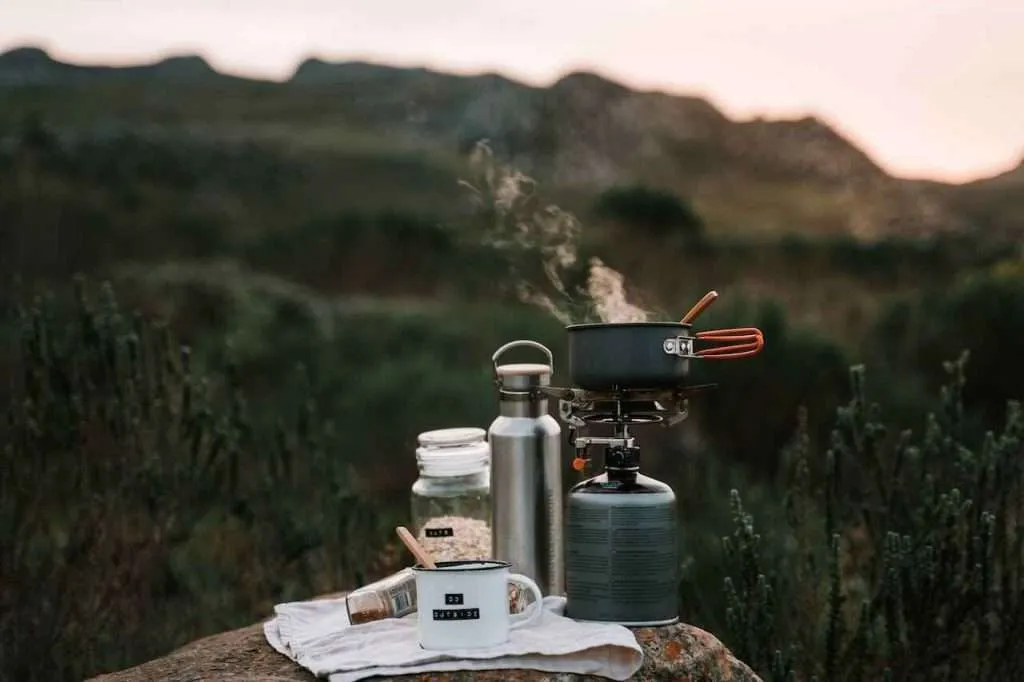
Utilize Camping-Friendly Cookware and Utensils
Invest in camping cookware and utensils specifically designed for outdoor cooking. Lightweight and durable options such as portable stoves, compact grills, and nesting cookware sets are ideal for camping. These tools are designed to withstand the rugged conditions of outdoor cooking and make meal preparation easier.
Pack Essential Condiments and Seasonings
Don’t forget to bring along essential condiments and seasonings to enhance the flavors of your camping meals. Consider packing items like salt, pepper, cooking oil, and your favorite herbs and spices in small, resealable containers. These little additions can make a big difference in transforming a simple camping breakfast into a flavorful feast.
Emphasize Cleanliness and Proper Food Storage
Maintaining cleanliness and practicing proper food storage is crucial for a safe and enjoyable camping experience. Wash your hands thoroughly before handling food and use separate cutting boards and utensils for raw and cooked ingredients. Store perishable items in a cooler with sufficient ice or ice packs to prevent spoilage and foodborne illnesses.
Plan and Prep Ahead
To minimize stress and save time during your camping trip, plan and prep your breakfast meals ahead of time. Prepare ingredients, chop vegetables, and pre-mix dry ingredients for recipes in advance. This way, you can simply assemble and cook your meals when you’re at the campsite, allowing you to spend more time enjoying the outdoors.
Practice Leave No Trace Principles
When cooking and enjoying your camping breakfast, follow Leave No Trace principles. Clean up after your meal, properly dispose of food waste, and avoid leaving any trace of your presence. It helps preserve the natural beauty of the camping area and ensures that it remains pristine for future visitors.
By following these tips, you can have a successful camping breakfast experience that is not only delicious but also hassle-free. Enjoy the morning tranquility and the aroma of a freshly prepared meal while immersing yourself in the beauty of nature.
Enjoy Your Trips on the Camping Breakfast Ideas
Camping breakfasts are a vital part of your traveling adventures. They provide the fuel and nourishment needed to start exciting outdoor activities while bringing your family closer together. By incorporating an array of camping breakfast ideas into your itinerary, you can start each day with a delicious and energizing meal.
From easy and quick options to creative recipes cooked over a campfire, there are plenty of choices to suit everyone’s preferences. Remember to plan your meals, pack suitable food items, and utilize proper cooking equipment and utensils. Pay attention to food storage and cleanliness to ensure a safe and enjoyable camping experience.
Whether you’re enjoying a simple bowl of cereal in the morning breeze or indulging in a Dutch oven breakfast casserole by the campfire, each camping breakfast holds the promise of new adventures and shared memories. With these ideas, you can easily prepare a delicious breakfast while hiking and camping. If you’re looking to find a hiking spot near you, it is recommended that you read the article “Hiking Trails Near Me: How to find the nearest hiking trails” to discover more.
So, the next time you venture out on a camping trip, don’t forget to fuel up with these camping breakfast ideas and make the most of your traveling adventures. Embrace the joy of starting your day with a satisfying meal in the great outdoors.
Safe travels and bon appétit!
